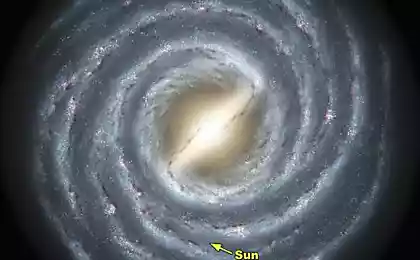578
Today will be one second longer than the other
Planet zamedlyaetsyaVtornik June 30, 2015 will officially be a little longer than the other days due to the fact that the days will be added to the standard one "leap second" or second coordination.

"The speed of the Earth's rotation is gradually slowing down a bit, a second additional help to take this into account," - explains Daniel McMillan of the Goddard Space Flight Center NASA.
One Earth day (a full rotation of the Earth on its axis) lasts 86,400 seconds. At least so accepted standard Coordinated Universal Time (UTC). The standard, in fact, is determined by the progress of ultra-precise atomic clocks, ie the duration of one second based on a transition between two states of the cesium atom. These "clock" is so reliable, that the difference of one second in hours based on cesium accumulates only in 1, 4 million years.
Scientists have calculated that in fact the Earth revolves around its axis in 86400, 002 seconds. Gradually the Earth's rotation is slowing down a little bit because of the kind of the braking force caused by the gravitational tug between the Earth, Moon and Sun.
On top of that most of the Earth - not hard, as plastic or liquid substance, the continents are moving, the ice caps are melting or growing up - all this does not allow the planet to rotate on its axis at regular intervals. Researchers have determined that the day is not exactly 86400 seconds lasted roughly from 1820.
via www.vesti.ru/doc.html?id=2635343

"The speed of the Earth's rotation is gradually slowing down a bit, a second additional help to take this into account," - explains Daniel McMillan of the Goddard Space Flight Center NASA.
One Earth day (a full rotation of the Earth on its axis) lasts 86,400 seconds. At least so accepted standard Coordinated Universal Time (UTC). The standard, in fact, is determined by the progress of ultra-precise atomic clocks, ie the duration of one second based on a transition between two states of the cesium atom. These "clock" is so reliable, that the difference of one second in hours based on cesium accumulates only in 1, 4 million years.
Scientists have calculated that in fact the Earth revolves around its axis in 86400, 002 seconds. Gradually the Earth's rotation is slowing down a little bit because of the kind of the braking force caused by the gravitational tug between the Earth, Moon and Sun.
On top of that most of the Earth - not hard, as plastic or liquid substance, the continents are moving, the ice caps are melting or growing up - all this does not allow the planet to rotate on its axis at regular intervals. Researchers have determined that the day is not exactly 86400 seconds lasted roughly from 1820.
via www.vesti.ru/doc.html?id=2635343
Fact of the day: Ravens intelligent mammals
"The myth of eternal beauty": you would be considered beautiful in a different era?
























